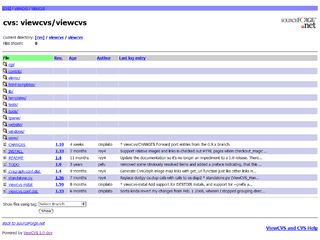Concurrent Versions System is a version control system originally developed by Dick Grune in July 1986.

GNU Wget is a computer program that retrieves content from web servers. It is part of the GNU Project. Its name derives from "World Wide Web" and "get". It supports downloading via HTTP, HTTPS, and FTP.
Splint, short for Secure Programming Lint, is a programming tool for statically checking C programs for security vulnerabilities and coding mistakes. Formerly called LCLint, it is a modern version of the Unix lint tool.

Skencil, formerly called Sketch, is a free software vector graphics editor, released under the GNU Lesser General Public License.
Cedega was the proprietary fork by TransGaming Technologies of Wine, from the last version of Wine under the X11 license before switching to GNU LGPL. It was designed specifically for running games created for Microsoft Windows under Linux. As such, its primary focus was implementing the DirectX API. WineX was renamed to Cedega on the release of version 4.0 on June 22, 2004.

NEdit, the Nirvana editor, is a text editor and source code editor for the X Window System. It has an interface similar to text editors on Microsoft Windows and Macintosh, rather than to older UNIX editors like Emacs. It was initially developed by Mark Edel for Fermilab and released under a very restrictive licence, but today it is distributed under the less restrictive GPL-2.0-or-later and is developed as an independent open-source project by a team of developers. Nedit was also distributed with the IRIX operating system.

FileZilla is a free and open-source, cross-platform FTP application, consisting of FileZilla Client and FileZilla Server. Clients are available for Windows, Linux, and macOS. Both server and client support FTP and FTPS, while the client can in addition connect to SFTP servers. FileZilla's source code is hosted on SourceForge.

ViewVC is an open-source tool for viewing the contents of CVS and SVN repositories using a web browser. It allows looking at specific revisions of files as well as side-by-side diffs of different revisions. It is written in Python and the view parameters can be modified directly in a URL using a REST style interface.
A source-code-hosting facility is a file archive and web hosting facility for source code of software, documentation, web pages, and other works, accessible either publicly or privately. They are often used by open-source software projects and other multi-developer projects to maintain revision and version history, or version control. Many repositories provide a bug tracking system, and offer release management, mailing lists, and wiki-based project documentation. Software authors generally retain their copyright when software is posted to a code hosting facilities.

Mercurial is a distributed revision control tool for software developers. It is supported on Microsoft Windows, Linux, and other Unix-like systems, such as FreeBSD and macOS.
LXR Cross Referencer, usually known as LXR, is a general-purpose source code indexer and cross-referencer for code comprehension that provides web-based browsing of source code, with links to the definition and usage of any identifier.
HTML Tidy is a console application for correcting invalid HyperText Markup Language (HTML), detecting potential web accessibility errors, and for improving the layout and indent style of the resulting markup. It is also a cross-platform library for computer applications that provides HTML Tidy's features.
Free Download Manager is a download manager for Windows, macOS, Linux and Android.
Fisheye is a revision-control browser and search engine owned by Atlassian, Inc. Although Fisheye is a commercial product, it is freely available to open source projects and non-profit institutions. In addition to the advanced search and diff capabilities, it provides:
The OpenH323 project had as its goal the development of a full featured, open source (MPL) implementation of the H.323 Voice over IP protocol. The code was written in C++ and, through the development effort of numerous people around the world, supported a broad subset of the H.323 protocol. The software has since been integrated into a number of open source and commercial software products.

Fossil is a software configuration management, bug tracking system and wiki software server for use in software development created by D. Richard Hipp.

Ayttm is a multi-protocol instant messaging client. It is the heir of the EveryBuddy project.
In version control systems, a repository is a data structure that stores metadata for a set of files or directory structure. Depending on whether the version control system in use is distributed, like Git or Mercurial, or centralized, like Subversion, CVS, or Perforce, the whole set of information in the repository may be duplicated on every user's system or may be maintained on a single server. Some of the metadata that a repository contains includes, among other things, a historical record of changes in the repository, a set of commit objects, and a set of references to commit objects, called heads.







